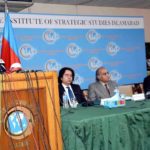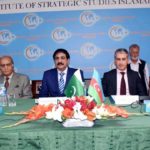ISLAMABAD, Pakistan: The National Security Adviser Lt General (retd) Nasser Khan Janjua on Tuesday reaffirmed Pakistan’s commitment to comprehensively upgrading bilateral cooperation with Azerbaijan across all areas of common interest.
While speaking at a Seminar on “Crime Against Humanity-Genocide and Ethnic Cleansing” organised by Institute of Strategic Studies Islamabad (ISSI) in collaboration with the Embassy of the Republic of Azerbaijan in Islamabad, Janjua said the government and people of Pakistan greatly valued the unequivocal support extended by Azerbaijan on the Kashmir dispute both at bilateral as well as multilateral fora.
Nasser Janjua said the high-level exchanges between Pakistan and Azerbaijan were a reflection of special brotherly ties between the two Countries and the mutual respect they had for each other.
“We are confident that through our joint efforts our fraternal ties and cooperative relations will acquire further depth in the years to come, to the mutual benefit of our two nations and regional peace and prosperity,” he said.
The adviser said since the independence of Azerbaijan in 1991, Pakistan and Azerbaijan had enjoyed close and cooperative relations. He said Pakistan was among the first Countries after Turkey and Romania to recognize Azerbaijan’s independence from the former Soviet Union in October 1991. He said diplomatic relations were established in June 1992 and Pakistan’s Embassy in Baku was opened in March 1993.
Nasser Janjua said Pakistan had always considered Azerbaijan a brother and friend, and greatly valued its friendly and cooperative ties with Azerbaijan which had deep roots in common faith, cultural affinities, and shared traditions.
The national security adviser said fatefully, both brotherly Countries had hostile neighbors yet they were fortunate in enjoying vocal support of each other on their regional disputes.
“We share identical positions on Nagorno-Karabakh issue and the Kashmir Conflict and want their resolution in accordance with International Law and UN Security Council Resolution,” he said.
Janjua said in 2012, Pakistan recognized the “Khojaly Tragedy” of 1992, which involved the inhumane massacre of their Azeri brothers and sisters in Karabakh, as genocide. He said Azerbaijan had Pakistan’s unqualified support over Nagorno-Karabakh issue with Armenia.
“As an expression of solidarity with Azerbaijan, Pakistan has not even recognized Armenia,” he added.
The adviser said Kashmir was in a state of constant unrest, and the State of India by using instruments like murder, rape and torture was committing crimes against humanity in Kashmir on a daily basis. He said their aim was to uproot the struggle of the Kashmiri people for self-determination.
Nasser Janjua said with each passing year, there was a visible change in demographics of Kashmir in a conscious effort of the Indian government to limit the Muslim majority of Kashmir.
Lt General (retd) Nasser Janjua said they deeply appreciated that Azerbaijan not only supported Pakistan on the issue of Jammu and Kashmir but was also a member of OIC Contact Group on Jammu and Kashmir, and that Azerbaijan had been actively participating in the meetings of the Contact Group. He said Pakistan had also joined the OIC Contact Group on Aggression of the Republic of Armenia against the Azerbaijan Republic.
Janjua said in a Joint Statement issued during the visit of the former Prime Minister Nawaz Sharif to Azerbaijan from October 13-15, 2016, the two sides held the mutual view that the early resolutions of Nagorno-Karabakh conflict and dispute of Jammu and Kashmir would help in promoting lasting peace, progress and development in the respective regions.
The adviser said in the current turbulent times, there was a growing tendency for ultra-nationalism and intolerance. He said persecution on political, religious and racial grounds was rampant whether it may be persecution of Rohingya Muslims by the Myanmar government at a State level or by international terrorist organizations like Daesh of the Yazidi community in Syria and Iraq.
“We raise our voice in opposition to Crimes against Humanity including genocide and ethnic cleansing on every national and international forum and formulate a joint front to counter such tendencies,” Janjua said.
Nasser Janjua said Pakistan had been very vocal on all these issues, and in case of Armenian aggression against territorial integrity of Azerbaijan, the Standing Committee on Foreign Affairs of the National Assembly of Pakistan had also passed a resolution in February 2017, condemning the occupation of Azerbaijani territories by Armenia. He said Pakistan stressed the need for early settlement of Nagorno-Karabakh conflict by peaceful means and in accordance with the relevant United Nations, Organization of Islamic Cooperation (OIC) and Organization for Security and Cooperation in Europe (OSCE) resolutions.
The adviser also congratulated Azerbaijan on its remarkable progress and development during the last 25 years across a wide spectrum of economic, scientific, educational and socio-cultural areas.
“We also appreciate the positive contribution being made by Azerbaijan to regional peace, stability and economic development,” Nasser Janjua said.
The Seminar was also attended by the Azerbaijan’s ambassador Ali Alizada, the Turkish ambassador Ihsan Mustafa Yurdakul and the Chairman ISSI Ambassador Khalid Mahmud.


